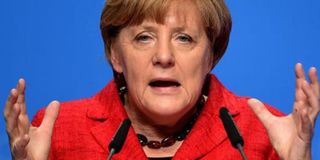Prime
Merkel visits Algiers in bid to curb Africa migrant flow

German Chancellor Angela Merkel
What you need to know:
- Last year, the success rate of asylum requests was 3.5 percent for Moroccans, 2.7 percent for Algerians and just 0.8 percent for Tunisians.
- German Interior Minister Thomas de Maiziere last year visited all three Maghreb countries to urge better cooperation on repatriations.
German Chancellor Angela Merkel visits Algeria from Monday to press efforts to get North African countries to reduce the flow of migrants across the Mediterranean into Europe.
Merkel, who last week hosted Tunisian Prime Minister Youssef Chahed, is hoping for partnerships with Maghreb countries and Egypt to prevent a new wave of migrants making the dangerous sea crossing to the EU.
Merkel arrives in Algiers at 1700 GMT before holding meetings with Prime Minister Abdelmalek Sellal and, on Tuesday, President Abdelaziz Bouteflika.
Algeria is a key actor in seeking to stabilise neighbouring Libya, which has lacked a functioning government since the 2011 overthrow of Moamer Kadhafi and has become the main gateway for African migrants bound for Italy.
But elsewhere in the region too, desperate people, many from sub-Saharan Africa, are trying to cross into the EU -- an influx the 28-nation bloc fears will rise again with the onset of warmer weather in spring.
Some 300 migrants Monday stormed the double wire fence between Morocco and the Spanish North African territory of Ceuta, after nearly 500 made it over on Friday, one of the largest groups in more than a decade.
Merkel's North Africa diplomacy comes after she spearheaded a controversial EU deal with Ankara a year ago that helped sharply reduce the influx of migrants who passed through Turkey and western Balkan countries into the bloc.
Public backlash
Merkel, confronted with the rise of the anti-immigration AfD party ahead of elections in September, has been under intense pressure to reduce the number of asylum seekers in Germany, which has taken in over one million migrants and refugees since 2015.
Public fears have been heightened by a number of jihadist attacks last year, especially the Berlin Christmas market truck rampage in December that claimed 12 lives, blamed on Tunisian rejected asylum seeker Anis Amri.
Previously, popular anger was fanned on New Year's Eve 2015-16, when large groups of mostly North African men sexually assaulted and robbed hundreds of women in the western German city of Cologne.
Merkel, as a sweetener to the North African countries, has pledged closer economic ties and more security cooperation in fighting jihadists, billed as efforts to discourage people from fleeing their countries in the first place.
During her visit to Algeria, an oil-rich major client for German defence exports, she will on Tuesday attend a meeting of the German-Algerian economic forum.
She promoted similar cooperation efforts last October during visits to major migrant transit countries Mali and Niger, which border Algeria.
Ultimately, Berlin has indicated it is hoping for some North African countries to set up holding facilities for African migrants rescued at sea, though no country has so far publicly voiced enthusiasm for the proposal.
Rights concerns
At home, Merkel is facing growing criticism from human rights groups for seeking to strike deals with Turkey and the Maghreb countries, given concerns over the rights records of their governments and security forces.
This concern has held up another policy goal of Merkel -- to officially designate Morocco, Algeria and Tunisia "safe countries of origin", as it has done with most Balkan countries -- to further raise the bar for asylum requests.
A bill to place the three countries in this category has been held up in Germany's upper house of parliament since mid-2016.
While most refugees from war-torn Syria have qualified for temporary safe haven in Germany, applicants from Algeria, Tunisia and Morocco already have mostly failed because their countries are considered stable.
Last year, the success rate of asylum requests was 3.5 percent for Moroccans, 2.7 percent for Algerians and just 0.8 percent for Tunisians.
German Interior Minister Thomas de Maiziere last year visited all three Maghreb countries to urge better cooperation on repatriations.



